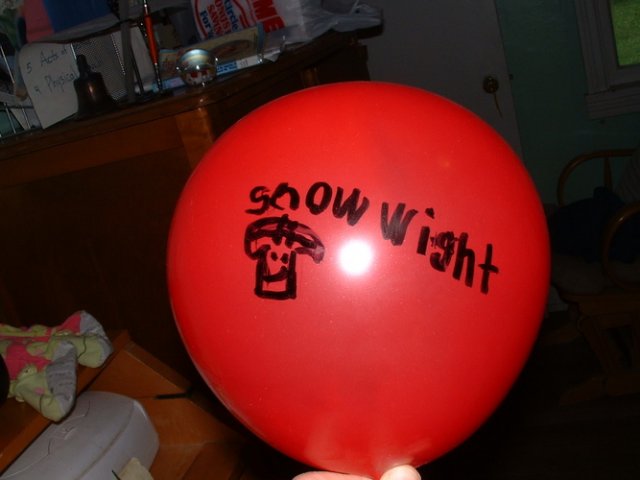One of the reasons I like Mallard Fillmore is that he can always be counted on to remember:

This Memorial Day I also want to honor a living veteran, who served as a WAVE in World War II, and who is
90 years old today!
(Not that she's likely to see this...but I honor her anyway.)
Permalink | Read 2424 times | Comments (0)
Category Everyday Life: [first] [previous] [next] [newest]
Food Rules: An Eater's Manual by Michale Pollan (Penguin, New York, 2009)
Food Rules is a condensation of what journalist Pollan has learned from his investigation of what's wrong with the American diet and how it can be improved. If this is the only Pollan food book you will read, or if you want to introduce his ideas to a skeptical friend with a short attention span, it rates five stars. Half of the 140 pages are merely pictures, and the other half are short and very easy to read.
I enjoyed reading through it, but am glad I borrowed it instead of buying it, as for my purposes The Omnivore's Dilemma and In Defense of Food are better. (On the other hand, at $6.60 from Amazon, the book costs no more than one of those fast food meals Pollan wants us to avoid.)
From #1 Eat food (as opposed to edible food-like substances) to #63 Break the rules once in a while, following these succinct suggestions would go a long way towards improving most people's diets. Best of all I like Pollan's relaxed attitude that reminds us that eating well isn't rocket science, nor is it onerous. It's a basic birthright that we have lost and must reclaim for ourselves and our children.
Today I almost gave up before I started. First, there was a blog post that I felt needed a comment, and I was guiltily trying to get it written without using up the entire hour, when I learned that there was yet another wrinkle in my ongoing struggles with the insurance company over a medical procedure from last year. (It isn't even an acrimonious battle; everyone agrees that the company should have paid. But one small error in a procedure code has taken months to rectify.) I thought we had finally gotten it straightened out, but this morning another charge popped up that the insurance company says it has paid but the provider says it hasn't received. I managed to take myself out of the middle and now have them talking directly to each other on this one—but by the time I was done my computer time was well over an hour, and the day barely started.
Still, I plowed on, deciding merely to log the time while trying to keep it down. That worked somewhat (though I did keep coming back to the machine more than I had hoped), until mid-afternoon, when I realized that the timer had been running throughout a long conversation with Porter and now read nearly four hours. Probably three of that was legit, but not really knowing the truth I again gave up the fight. At least I lasted longer than I did yesterday.
Ganbarimasu!
Last night I finished a project that had kept me welded to the computer for the better part of several days, and I awoke wondering if it would be possible to go through a day limiting my computer use to one hour. The experiment started out well enough, though I had accomplished but the minimum of my normal morning computer routine when I realized I'd already used up a quarter of the time. It was not too hard, however, to set the routine aside and turn to (mostly) non-computer-related projects. I felt empowered, and looked forward to a day of accomplishment. Occasionally I needed the computer briefly for something I was doing, but managed to do the job and get off, resisting the temptation to check blogs, news, or e-mail.
That lasted till maybe 9 a.m. (More)
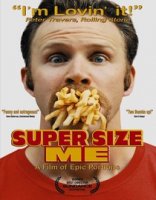 Super Size Me (Sony, 2004, PG-13)
Super Size Me (Sony, 2004, PG-13)
When Morgan Spurlock was growing up, his mother made the family's meals at home; they ate at restaurants only on very rare, special occasions. Once a common scenario, it is no longer true for Fast Food America.
Spurlock, young, healthy, and in fine physical condition, turned himself into a human guinea pig to investigate the health effects of fast food: For 30 days, he ate at McDonalds, and only McDonalds, three meals a day, every day. His progress (regress) was evaluated and monitored by three doctors, who expected to see no more problems from his change of diet than a moderate rise in his triglyceride levels. Instead, nearly every aspect of his physical and mental health disintegrated rapidly; it took him more than a year to recover from his month-long binge.
Super Size Me is a dramatic condemnation of the fast food industry, and even more so of modern America's eating habits. However, it would have been more effective, if less dramatic, had Spurlock have eaten reasonably instead of deliberately (and sickeningly) gorging himself at every meal. He conflates problems of food quality and food quantity, muddying the results.
The movie is somewhat interesting, but I'd rate it worse than PG-13 for sexual content and language. Unlike some reviewers, I don't find the graphic bariatric surgery to be a problem, but I wouldn't watch it while eating.
Lenore Skenazy's Free-Range Kids blog is one of my favorite antidotes to the frustrations of modern life, and the outrageous stories she finds make great pass-along blog fodder, though they probably don't do my blood pressure any favors.
In an attempt to resurrect the once-normal sight of kids playing outdoors with their friends till the sun goes down—now unthinkable to many parents despite a crime rate lower than when they themselves played outside unsupervised—she declared tomorrow, May 22, to be Take Our Children to the Park...and Leave Them There Day. I don't think she was expecting quite the firestorm she created when she suggested that pre-teens could survive for half an hour without their parents hovering nearby. You can read all about it, positive and negative, on her blog. (More)
Permalink | Read 2221 times | Comments (2)
Category Children & Family Issues: [first] [previous] [next] [newest]
 The Dark Ages (The History Channel, 2007, not rated)
The Dark Ages (The History Channel, 2007, not rated)
Having worked for a number of months in New York City, Porter had the opportunity both to explore the History Channel on television and to observe throughout the city the advertising placards proclaiming, "The History Channel: Where History Is Made Every Day." If he were a vandalizing sort of person, New Yorkers would have soon seen a slight alteration in the slogan:

With my expectations sufficiently lowered, I found The Dark Ages not to be too bad. (Thanks, Netflix.) It's not my favorite approach to a historical documentary—Ken Burns set a standard that is hard to beat. The tone is unpleasantly sensationalistic, and the re-enactments almost painfully unprofessional. But the facts are consistent with what little I know of the time period (as consistent as historians get, anyway), and without doubt the show packs an amazing amount of history into 94 minutes.
I believe history needs to be taught using many sources, and many approaches. Not only does this help balance out the inevitable bias each historian brings to his work, but I'm sure I'm not the only person who needs to hear a fact at least three times before it sticks with me. The Dark Ages is not a great show, but it works well in this context.
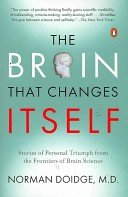 The Brain that Changes Itself: Stories of Personal Triumph from the Frontiers of Brain Science by Norman Doidge (Penguin, New York, 2007)
The Brain that Changes Itself: Stories of Personal Triumph from the Frontiers of Brain Science by Norman Doidge (Penguin, New York, 2007)
Neuroplasticity.
The idea that our brains are fixed, hard-wired machines was (and in many cases still is) so deeply entrenched in the scientific establishment that evidence to the contrary was not only suppressed, but often not even seen because the minds of even respectable scientists could not absorb what they were certain was impossible. Having been familiar since the 1960s with the work of Glenn Doman and the Institutes for the Achievement of Human Potential, the idea that the human brain is continually changing itself and can recover from injury in astonishing ways did not surprise me. In fact, the only shock was that in a 400 page book on neuroplasticity and the persecution of its early pioneers I found not one mention of Doman's name. But the stories are none the less astonishing for that.
In Chapter 1 we meet woman whose vestibular system was destroyed by antibiotic side-effects. She is freed by a sensor held on her tongue and a computerized helmet from the severely disabling feeling that she is falling all the time, even when lying flat. That's the stuff of science fiction, but what's most astounding is that the effect lingers for a few minutes after she removes the apparatus the first time, and after several sessions she no longer needs the device. (More)
Permalink | Read 8186 times | Comments (6)
Category Reviews: [first] [previous] [next] [newest] Education: [first] [previous] [next] [newest] Health: [first] [previous] [next] [newest] Children & Family Issues: [first] [previous] [next] [newest]
We recently returned from a lovely two weeks in Switzerland (with brief side trips to France, Germany, and Italy). I hope eventually to post more pictures and stories, but here's a start.
Just over a week before our scheduled departure from the U.S., the Icelandic volcano, Eyjafjallajokull, threw a spanner into the works for European flights. Porter wrestled for a while with changing our itinerary to go through airports less risky than Amsterdam's Schiphol, but with the ash cloud as unpredictable as it was, decided the best course was to hand on to what we had. We did what we always do when there's nothing else we can do (and even when there is): we prayed a lot. Unlike that of our friend who needed to get to her brother's funeral (she made it), this was not a critical flight, but the primary purpose of the trip was to attend Janet's end-of-school recital, and we would have been very sad to miss it, having not yet heard any of her grad school performances. (More)
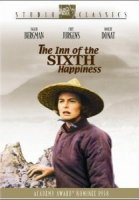 The Inn of the Sixth Happiness (20th Century Fox, 1958, not rated)
The Inn of the Sixth Happiness (20th Century Fox, 1958, not rated)
A sympathetic and positive portrayal of a segment of the life of Gladys Aylward, the British Christian servant girl with a powerful love of both God and China. This small woman (incongrously but convincingly played by Ingrid Bergman) had great impact in northern China during the tumultous 1930's and 40's. Single-handedly leading nearly 100 children over the mountains to safety during the Japanese invasion, and persuading the remote villages to comply with the new law against the footbinding of women, were but a small part of her successes.
As movies go, this one is reasonably true to the story. I realize that's damning with faint praise, but I've learned to lower my expectations for truth from movies, which must alter events to make a convincing story fit in under three hours, and must include non-existent romantic scenes to please the audience. Perhaps its worst crime is in making Aylward's extremely arduous life look easy. In addition to the "normal" hardships of malnutrition and hard labor, she was beaten, tortured, shot, and severely injured in a bomb blast, but Bergman's hair is never mussed more than can be fixed with a quick flick of her fingers, and the journey across the mountains seems almost as easy as the end of The Sound of Music.
It's a fun and inspiring movie, worth watching if you also make a point of learning "the rest of the story." As much as can be learned, anyway: Aylward was old, with broken health and failing memory, when her story was finally written down, so much remains unknown.
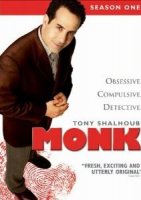
Monk, the television show about obsessive-compulsive detective Adrian Monk, ran from 2002 - 2009. We encountered it in 2007, thanks to Netflix and the suggestion of a friend, and completed the eighth and last season this month. Part mystery, part comedy, and part fantasy, Monk ranks as the only television show for which we have seen every episode. (More)
Today's Mallard Fillmore comic inspired this post, which Li'l Writer Guy had actually been working on in the background ever since a conversation we had about the subject last night.

Mind you, I don't know any of the details of how it will work, and am only commenting on the theory that children should be covered on their parents' health insurance until they are 26 years old. (More)
I am not going to join the recent chorus of voices crying that multitasking is a bad thing. It can relieve tedium (listening to lectures while ironing), increase efficiency (knitting while keeping an eye on swimming children), and add to enjoyment (conversing while eating). What's more, if mothers couldn't multi-task, the whole world might crash to a halt.
Nonetheless, there is increasing evidence—in scientific studies and in my own life—that multitasking can also lead to poor performance on all tasks. Conducting a business deal via cell phone while driving may increase your productivity, but not if it distracts you from brake lights suddenly appearing on the car ahead. Fixing dinner while talking to a friend on the telephone may cause you to miss a critical change in her tone of voice—or to burn the meal.
I was inspired a month ago to make Pay Attention this month's resolution. If there was a specific reason I no longer remember it, but the decision was confirmed when I read The Brain that Changes Itself, a book that showed up in my mailbox after I unexpectedly won it in a contest. Here are some of my thoughts as I evaluate multitasking, and areas in my life where I need to be more attentive. (More)
Permalink | Read 2782 times | Comments (0)
Category Everyday Life: [first] [previous] [next] [newest]
Our six year old grandson is brilliant, of course: great in reading, great in math, and, as those of you who know our family will agree, also great in spelling. (Photo credit the Daleys.)
Permalink | Read 2216 times | Comments (0)
Category Everyday Life: [first] [previous] [next] [newest]

